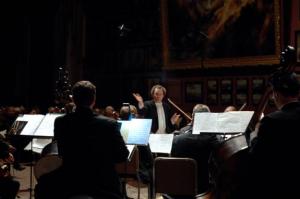- Home
- About
- About SCMS
- Directors
- Artists
- Vera Beths
- Steven Dann
- Marc Destrubé
- James Dunham
- Mark Fewer
- Eric Hoeprich
- Christopher Krueger
- Myron Lutzke
- Marilyn McDonald
- Douglas McNabney
- Mitzi Meyerson
- Pedja Muzijevic
- Anca Nicolau
- Jacques Ogg
- Loretta O'Sullivan
- Lambert Orkis
- Paolo Pandolfo
- William Purvis
- Marc Schachman
- Jaap Schröder
- Andrew Schwartz
- William Sharp
- Ian Swensen
- Lucy van Dael
- Ensembles
- Concerts
- The Collection
- Recordings
- Education
- Donate

The Smithsonian Chamber Orchestra was established in 1982 as a period-instrument ensemble for Viennese Classical-era music. Jaap Schröder conducted the orchestra from his concertmaster position through 1987, leading it in many concerts and in two major recording projects of works by Mozart and Beethoven. Kenneth Slowik became conductor in 1988, continuing the Beethoven symphony and piano concerto cycles. He also led Washington’s first historically-informed performances of the major Bach choral works, culminating in a recording of the St. John Passion, BWV 245, that was judged “unequivocally the best of the period instrument recordings” by the Cambridge Guide to Choral Music on Record. In the mid 1990s, Slowik and the Orchestra began to explore the repertoire and performance practices of the late 19th and early 20th centuries through works of Elgar, Schönberg, Mahler, Richard Strauss, and others. Recent productions have included works of Stravinsky, Copland, Bartók, and Shostakovich, all presented with intense focus on drawing the most rhetorically expressive performances from a group of dedicated and engaged musicians.


